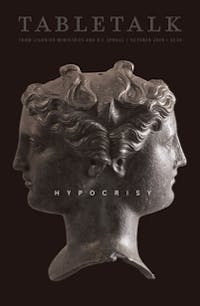
Request your free, three-month trial to Tabletalk magazine. You’ll receive the print issue monthly and gain immediate digital access to decades of archives. This trial is risk-free. No credit card required.
Try Tabletalk NowAlready receive Tabletalk magazine every month?
Verify your email address to gain unlimited access.
As seen in other articles this month, the word hypocrisy derives from the Greek term for “playing a part.” The ordinary word for an actor on the stage in Greek drama was hypocrite. In the tragedies of Sophocles or the comedies of Aristophanes, the actors — the hypocrites — played their different parts by wearing masks. The moral transgression of hypocrisy also involves playing a part and wearing a mask. But there are also times when God calls us to play a part.
Today’s culture is tolerant of almost every behavior, except hypocrisy. Our society has no problem with someone who is homosexual or who uses pornography. But if a crusader against legalizing gay marriage turns out to be homosexual, or if a minister who preaches against pornography turns out to have porn on his computer, the full weight of ridicule, indignation, and social disapproval falls upon his head. Not for his vices, but for opposing the vices that he himself has. For wearing a mask of virtue when he himself is not virtuous. For being a hypocrite.
Christians need to expect this treatment. Hypocrisy is certainly wrong. But inconsistency between belief and behavior is not always hypocrisy. No one hates a sin more than someone who is honestly struggling with it in his own life.
Many Pharisees in the New Testament and the legalists of our own day consider themselves to be such good people that they do not need God’s forgiveness. But they do. Christians who are honest with themselves and with God — who, whatever their sins, are not hypocrites — may still be asked to “play a part.”
God redeems people through Christ, and then He calls them to live out their faith in their vocations. He calls Christians to love and serve their neighbors in their multiple vocations, which are the arenas for sanctification and Christian growth.
In vocation, God places us into certain “offices,” some of which share His authority. Some of these demand that we “play a part,” even putting on a mask. This is expressed in the ages-old custom that certain vocations be marked with special clothing. As a private citizen, a judge has no more right to send a person to prison than anyone else. But when he puts on his “robe of office,” he is acting in his official capacity as an agent of the law, and, according to Romans 13, of God Himself. Acting by virtue of his “office,” he does indeed have the authority to punish criminals on behalf of the state as a whole.
In many churches, a pastor wears a robe of some kind, signifying that when he is up in the pulpit, we in the pews should not consider him our good friend and fishing buddy, though he may be that. When he is acting in his office, he is teaching us not his word but God’s Word, which he has studied and is authorized to teach.
There was a study of patients who were attended to by a doctor who wore jeans and a t-shirt, rather than the traditional white lab coat. Patients universally objected! No one wants someone who looks like an ordinary man off the street to give them a medical examination. That white lab coat, though, is a symbol of vocation, that the doctor is authorized to poke around our bodies by virtue of his calling, his training, and his office.
This is why police officers wear uniforms. And why there are different standards in the Geneva Conventions for soldiers who wear the uniform of their country — and thus fall under a lawful chain of command that goes back to the Romans 13 authority of the lawful magistrate — and combatants such as terrorists who fight only on their own authority and who wear no uniform.
Sometimes the duties of our vocations — not all of which have uniforms — require us to fulfill an office, even if it goes against our nature. A father may have to discipline his child. He may not want to. He may even feel conflicted because he pulled the same stunt when he was his child’s age. A father who used marijuana as a teenager is not being hypocritical when he punishes his teenager for using drugs. He is fulfilling his office as father.
Against their inclinations but to carry out the duties of their offices, teachers sometimes have to give bad grades; employers must sometimes fire incompetent employees; pastors must sometimes exercise church discipline, even against a friend. A newly minted young officer fresh out of ROTC must assume authority over a company of rough combat veterans who are older than he is. He may be nervous and may feel out of place, but he puts on the mask of command and orders his troops to attention. Spouses may not always feel like loving husbands and loving wives, but in “playing their part” they fulfill their vocations and God’s will for their marriage.
If vocation requires us to put on masks, it is worth remembering that Luther taught that those who love and serve their neighbors in vocation are themselves “masks of God.” Looming behind the farmer, the doctor, the soldier, the pastor, and the parent is God Himself providing daily bread, healing, protecting, ministering, and giving life.
The parts we play may indeed be hypocritical. But when God asks us to play a part, He is also playing a part through us.
